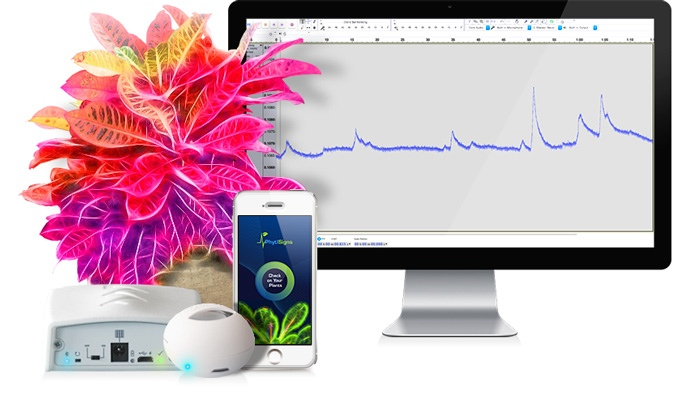Well, "talk" isn't the right word perhaps. A video which shows said device in action suggest it is more of an irregular, unnerving wail. It's not something I'd regularly want to hear in my home. But this isn't the point. The point is: there is a Kickstarter campaign running right now, aiming to raise money for something that could possibly help bring about a big step forward in plant science and our understanding of plants.
The story goes thus: As early as 1873 it was discovered that plants emit electrical signals. But hardly anything is known about why they do and when. There's simply not much research to date. And that's to a large extend down to the fact that these signals are very weak and hard to pick up, drowned out "by background electromagnetic interference" as the experts explain. Studies have recorded such signals when a plant is wounded. So a theory is that plants under stress will tell the world they suffer not just by emitting chemical compounds (something well established in research) but also by electrical signals. Or perhaps not the world: as far as I understood, electrical signals are for internal communication. There may be more such reactions to a plant's environment, and perhaps these signals have a particular biological function, too. But so far no one really knows.
Swiss company Vivent SARL have now created a device that is able, they claim, to pick up these weak signals much better because it is directly connected to the plant. They are then amplified so you can either hear them via an attached speaker or see the graph via an app on your phone or tablet. Via two electrodes - one inserted in the soil, the other clipped on a leaf or stem - the voltage is measured and when it changes, you'll hear a squeal. The faster the change, the higher the squeal. Or the amplitude of the graph, of course. Wearable tech for plants, then. Whilst previously a costly and complicated laboratory setup was needed and signals could only be measured for short periods of time, the claim is that now everyone can record these and for days, weeks or even months. It also means that instead of in the highly artificial surroundings of a specialized lab chamber plants' signals can now be measured in their own natural environment, even out of doors apparently.
In addition to injury, experts already know that a difference in light - i.e. light/darkness as well as different types of light such as daylight versus light bulb, neon light, etc. - makes a plant react by emitting electrical pulses. They also claim watering or misting triggers a noticeable reaction, though an external expert seems to doubt this. The New Scientist, first to report on the campaign, quotes an Austrian plant biophysicist as saying "When sprayed with water, the plant immediately responded with voltage changes. These electrical signals are just too fast and are not generated by the plant." I think he has a point: As water conducts electricity very well, it seems quite likely - to me anyway - that the changes measured may have occurred on the leaf surface or in the soil, rather than the plant itself. Still, the New Scientist also quotes someone else who gives credibility to the overall claim of Phytl Signs EXPLORER being able to pick up electrical plant signals well.
It is interesting to note in this context, that the Kickstarter campaign is aimed at least as much at the tech geeks and gadget lovers as it is at plant lovers and/ or gardeners. When I last looked, press coverage about the campaign (as listed on its webpage) was mainly in publications catering to the former, with trade magazine horticulture week the only one specifically targeted at "plant people". Also, the Vivent SARL experts are tech entrepreneurs and engineers rather than people with a background in plant-related sciences, and only one of them is mentioned as being a keen amateur gardener. However, in my opinion this does not make the venture any less compelling and worthwhile.
Learning about electrical signals might help avoid unnecessary stress
In the New Scientist article the people behind Phytl Signs EXPLORER admit they hope that "the appeal of listening to your house plants will grab the imagination of enough people to help fund improvements to the device and a large production run". It is about fine-tuning the technology and decoding the signals in the first place. And despite the Kickstarter page rather daftly asking "What will your plants say to you - and how will you respond?", it is less about creating a gadget with which you can (but may not want to) listen to your newly-fashionable Sanseveria. With Phytl Signs RESEARCH and Phytl Signs PROFESSIONAL respectively, Vivent SARL produces - or intends to produce - similar devices for the academic as well as the horticultural and agricultural community. Because despite the exciting insights hoped for, the ultimate goal is not just the advancement of science either. There is practical value in deciphering electrical pulses sent by plants.
As there are clear differences in signals when a plant grows vitally and when it switches to defence mode, for instance, and these changes are almost immediate after a change of conditions, a grower will know much faster about whether a plant thrives or suffers. Due to this early warning, he or she will thus be able to react much more quickly to alleviate a problem. At least they will be, once the signals have been decoded. As tech entrepreneur and Vivent SARL co-founder Dr Nigel Wallbridge explained in horticulture week: "By listening to what our plants are telling us, we can, together, start to understand them. This is exciting for everyone interested in the environment, sustainability, the future of food and open agriculture. If we can see the first signs of water stress, then we could minimise the amount of water needed for agriculture. If we can detect the first sign of disease, we can stand a better chance of preventing crop failures all over the world. The possibilities are far reaching."
So while personally I prefer to closely observe my plants rather than get them wired up, I seriously consider contributing to the Phytl Signs Kickstarter campaign. It runs until July 29th. Many people's pennies also make a pound :-)


 RSS Feed
RSS Feed